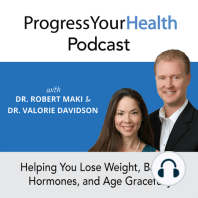1 min listen

What are the Symptoms of Low Cortisol? | PYHP 049
What are the Symptoms of Low Cortisol? | PYHP 049
ratings:
Released:
Sep 17, 2018
Format:
Podcast episode
Description
Question: Hello, I am an almost 41 yr old female and I just read an article about cortisol levels (vampire, ghost, and zombie) that you wrote, and I'm curious to know more. I think that I'm like the vampire the most, but not exactly. I had a saliva test done recently and the results said that my levels were extremely low in the morning, then went to normal around noon but then by 4-5 they were dropping again. My doctor put me on progesterone because my estrogen to testosterone ratio was pretty severe (high estrogen/low testosterone). Although I take them at night because they make me extremely tired, I can't but feel the struggle even more in the morning now. Will DHEA help? Or anything? Thanks, Jaime
Jamie is referring to an article we wrote about cortisol levels, adrenal fatigue, and sleeping patterns. Cortisol is a very important hormone. Without cortisol, we cannot live. But having your cortisol levels balanced plays an important part in daytime energy and sleeping patterns at night. Cortisol is released from your adrenals glands in a diurnal curve . Meaning, cortisol is highest in the morning so you wake up bright eyed and bushy tailed , ready to start your day. Over the afternoon the cortisol will dip slightly. Come evening it will drop dramatically so you are ready to go to sleep and stay asleep all night long.
In this episode, we talk about three dysfunctional cortisol curves that affect sleep and daytime energy. Having dysfunctional cortisol levels can create havoc on a person's quality of life. We didn't want to poke light at these dysfunctional patterns as these are serious issues. But to help with learning and teaching we created three types of dysfunctional cortisol patterns relating to adrenal fatigue.
Three types of dysfunctional cortisol release patterns that affect and contribute to adrenal fatigue. We call these types, The Vampire, Ghost A / Ghost B, and The Zombie.
Vampire: The Vampire has high cortisol in the evening and low cortisol in the morning. That makes the Vampire feel really good at night. Inevitability because Vampires feel so good at night, they have a hard time falling asleep. They will stay up late because they actually feel normal in the evening. But come morning, they have a hard time getting out of bed. These are the people that press snooze multiple times and usually takes them forever to get out of bed. Even though they reluctantly crawl out of bed, they still complain about brain fog and feeling tired until at least midmorning.
Ghost: The Ghost is the person that falls asleep easily. They always say, I have no problem falling asleep. My head hits the pillow and I am out. But I always wake up a 2-4 hours later . That is because their cortisol is low in the evening. But will raise up in the middle of the night, waking them up. You will find your Ghosts roaming the house in the middle of the night. They might end up watching TV, eating, playing on their phones or even checking their email. Some get so fed up waking up in the middle of the night that they just get up and start their day. Most Ghosts feel fairly well in the morning. But they disappear and Ghost everyone in the afternoon. Between 1230 and 330pm
Released:
Sep 17, 2018
Format:
Podcast episode
Titles in the series (100)
What Are The Best Blood Tests for Thyroid Function? | PYHP 19: The most common test for thyroid is the TSH, which stands for Thyroid Stimulating Hormone. Unfortunately, this is also the only test most conventional doctors use to screen for thyroid disease. If the TSH is elevated (above 4.5 mIU/L), you are hypothyr by Progress Your Health Podcast